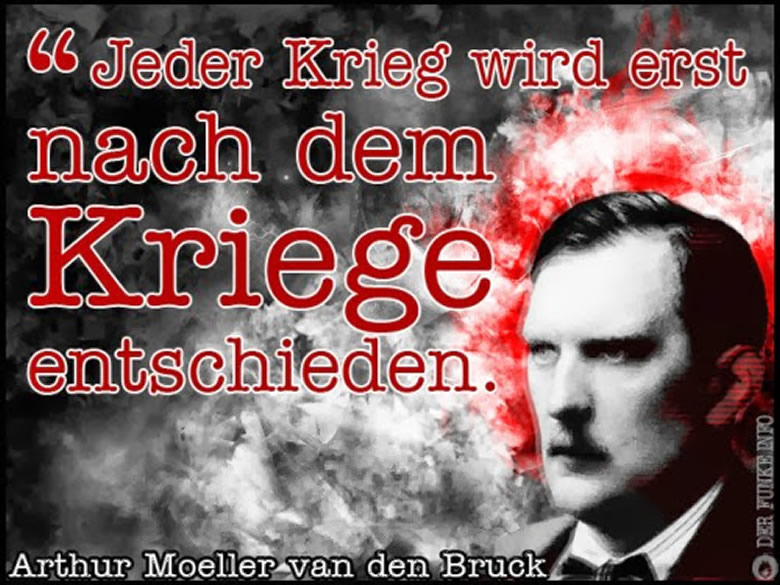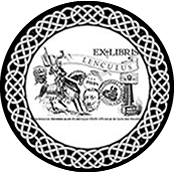
Arthur Moeller van den Bruck - Germany's Third Empire
Prefactory Letter To Heinrich von Gleichen
I. Revolutionary : Let us win the Revolution
II. Socialist : Each People has its own socialism
III. Liberalism : Liberalism is the death of nations
IV. Democrat : Democracy exists where the people take a share in determining their own fate.
V. Proletarian : The Proletarian is such by his own desire.
VI. Reactionary : A Policy may be reversed: History cannot.
VII. Conservative: Conservatism has eternity on its side.
VIII. The Third Empire: We must have the strength to live in antithesis.
Dear Gleichen,
This book contains an analysis of the political parties. It is addressed to Germans of every party. It discusses their ideologies, and their party types.
The attempt this books makes was not possible from any party standpoint; it ranges over all our political problems, from the extreme Left to the extreme Right. It is written from the standpoint of a Third Party, which is already in being. Only such an attempt could address itself to the nation while attacking all the parties; could reveal the disorder and discord into which the parties have long since fatefully fallen and which has spread from them through our whole political life; could reach that lofty spiritual plane of political philosophy which the parties have forsaken, but which must for the nation’s sake be maintained, which the conservative must preserve and the revolutionary must take by storm.
Instead of government by party we offer the ideal of the THIRD EMPIRE. It is an old German conception and a great one. It arose when our First Empire fell; it was early quickened by the thought of a millennium; but its underlying thought has always been a future which should be not the end of all things but the dawn of a German age in which the German People would for the first time fulfil their destiny on earth.
In the years which followed the collapse of our Second Empire, we have had experience of Germans; we have seen that the nation’s worst enemy is herself: her trustfulness, her casualness, her credulity, her inborn, fate-fraught, apparently unshakable, optimism. The German people were scarcely defeated—as never a people was defeated before in history—than the mood asserted itself: "We shall come up again all right!" We heard German fools saying: "We have no fears for Germany!" We saw German dreamers nod their heads in assent: "Nothing can happen to me!"
We must be careful to remember that the thought of the Third Empire is a philosophical idea; that the conceptions which the words "Third Empire" arouse—and the book which bears the title—are misty, indeterminate, charged with feeling; not of this world but of the next. Germans are only too prone to abandon themselves to self-deception. The thought of a THIRD EMPIRE might well be the most fatal of all the illusions to which they have ever yielded; it would be thoroughly German if they contented themselves with day-dreaming about it. Germany might perish of her Third Empire dream.
Let us be perfectly explicit: the thought of the Third Empire—to which we must cling as our last and highest philosophy—can only bear fruit if it is translated into concrete reality. It must quit the world of dreams and step into the political world. It must be as realist as the problems of our constitutional and national life; it must be as sceptical and pessimistic as beseems the times.
There are Germans who assure us that the Empire which rose out of the ruins on the Ninth of November is already the Third Empire, democratic, republican, logically complete. These are our opportunists and eudaemonists. There are other Germans who confess their disappointment but trust to the "reasonableness" of history. These are our rationalists and pacifists. They all draw their conclusions from the premisses of their party-political or utopian wishes, but not from the premisses of the reality which surrounds us. They will not realize that we are a fettered and maltreated nation, perhaps on the very verge of dissolution. Our reality connotes the triumph of all the nations of the earth over the German nation; the primacy in our country of parliamentism after the western model—and party rule. If the THIRD EMPIRE is ever to come it will not beneficently fall from heaven. If the THIRD EMPIRE is to put an end to strife it will not be born in a peace of philosophic dreaming. The THIRD EMPIRE will be an empire of organization in the midst of European chaos. The occupation of the Ruhr and its consequences worked a change in the minds of men. It was the first thing that made the nation think. It opened up the possibility of liberation for a betrayed people. It seemed about to put an end to the "policy of fulfilment" which had been merely party politics disguised as foreign policy. It threw us back on our own power of decision. It restored our will. Parliamentism has become an institution of our public life, whose chief function would appear to be—in the name of the people—to enfeeble all political demands and all national passions.
When the Revolution overwhelmed the War, burying all prospects and all hopes, we asked ourselves the inner meaning of these events. Amidst all the insanity we found a meaning in the thought that the German nation would be driven into becoming politically-minded: now, at last, belatedly.
We said to ourselves then that this war was going to be our education.
Today we ask in despair: Has it, in fact, been so ?
In bitterness we venture to hope: It will prove to have been so.
In this faith,
Yours,
MOELLER VAN DEN BRUCK
Berlin
December, 1922
Arthur Moeller van den Bruck - PDF
Third Reich - PDF



